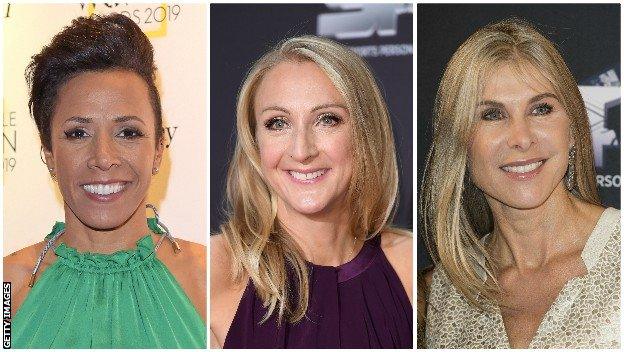Dame Kelly Holmes, Paula Radcliffe and Sharron Davies to write to IOC over transgender athletes
- Published

Dame Kelly Holmes, Paula Radcliffe and Sharron Davies all want more research on transgender athletes
Dame Kelly Holmes, Paula Radcliffe and Sharron Davies say they are going to write to the International Olympic Committee asking for more research on the "residual benefits" of being a transgender athlete.
Under IOC guidelines, athletes who have transitioned from male to female are required to have kept their levels of testosterone - a hormone that increases muscle mass - below a certain level for at least 12 months.
Former swimmer Davies said:, external "We all need a safe and fair place to compete."
The 1980 Olympic silver medallist said the private letter had gained support from "loads" of elite athletes but asked for more to back her, Radcliffe and ex-athlete Holmes, who won 800m and 1500m gold at the 2004 Olympics.
Marathon world record holder Radcliffe has said elite sport could be "manipulated" and also questioned whether it was "fair for a biological man to compete alongside women".
There has been widespread debate recently about the fairness of transgender women competing in female sport. Transgender cyclist Rachel McKinnon, an age-group world champion, accused tennis' 18-time Grand Slam singles champion Martina Navratilova of being a "transphobe" for suggesting that the participation of transgender women in women's sport could be equivalent to "cheating".
Navratilova later apologised for the use of the word "cheat".
Radcliffe told BBC Sport earlier this month that more research is needed to establish an appropriate level of testosterone in transgender women in order to create fair competition.
She also called for a halt to the "attacking and bullying" which she believes has existed between groups and individuals with contrasting views.
According to IOC guidelines, set in 2015, the current level of testosterone allowed for athletes is at 10 nanomoles per litre.
Athletes who have transitioned from female to male can compete without restrictions.
The IOC said it expected to publish updated guidelines after a lengthy consultation with various stakeholders. They include the IOC medical and scientific commission, medical, scientific, human rights and legal experts, plus international federations and national governing bodies.
It added: "It is the international federations' remit to decide eligibility rules on a sport, both for hyperandrogenism and transgender."